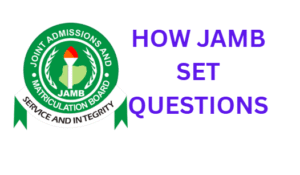Do you know how JAMB set questions? You’re seated in front of a computer screen at the Computer-Based Test (CBT) center. The timer is counting down. You click “Start Exam”, and questions begin to appear. Some are familiar. Others? Not so much. But here’s the real question, who sets these JAMB questions? Where do they come from? And how does JAMB decide what to test you on? If these questions have ever crossed your mind, you’re not alone.

In this detailed, no fluff guide, we’ll explore how JAMB sets questions from planning to execution, using verified, relatable, and up to date information also we’ll give you the smartest tips that will help you as a JAMB candidate. So whether you’re a first timer or retaking the exam, this is the guide you’ve been looking for.
What Is JAMB and Why Should It Matter to You?
If you’re planning to continue your education in a Nigerian university, polytechnic, or college of education, you’ve probably heard of JAMB and maybe even stressed about it. But what exactly is this body, and why does it hold such power over your academic future? JAMB is short for the Joint Admissions and Matriculation Board. It’s the official agency responsible for conducting the Unified Tertiary Matriculation Examination, better known as UTME. This exam serves as the gateway to higher education in Nigeria. Now here’s the thing, each year, this single exam brings together a staggering number of hopeful students.
Just in 2025, for instance, over two million candidates signed up to take it. That’s not just a statistic; it means millions of dreams, ambitions, and futures resting on one test. And with such a massive crowd all aiming for a limited number of slots in Nigerian institutions, it’s clear that the way JAMB operates especially how it sets its questions plays a huge role in who gets in and who doesn’t. So that raises an important question; How are these questions formed? Who decides what topics to include? And how can students trust that the system is fair?That’s exactly what we’re about to explore.
General insight on how questions are set in JAMB
1. It All Starts with the Curriculum
JAMB doesn’t create questions out of thin air. The first and most important reference point is the Nigerian Secondary School Curriculum, particularly the Senior Secondary School Syllabus developed by relevant education authorities. Each subject offered in UTME has a dedicated syllabus, and this is publicly available. This means that every topic JAMB tests you on has already been taught or should have been in your SS1 to SS3 classes. Example: If you’re taking Literature in English, your questions will come from the recommended texts and themes in the JAMB syllabus not any extra or obscure book. So yes, JAMB stays within scope. It’s not about trying to fail you; it’s about testing your understanding of what was taught in school.
2. Who Sets the Questions?
This is one part many students wonder about and understandably so. The truth is, JAMB uses subject matter experts, often referred to as experienced educators or resource persons. These are people who have taught the subject for years and have in depth knowledge of both the content and the exam structure. They are not publicly named, but they are selected for their expertise in specific subjects from Chemistry to Government, Literature to Physics. These experts are guided by:
- The official JAMB syllabus
- National education standards
- CBT format and question types (objective questions for UTME)
They don’t work alone either which brings us to the next point.
3. The Question Vetting Process
After the initial questions are drafted by the experts, they go through several rounds of review and editing. A separate group of professionals (also subject experts) are assigned to vet and moderate the questions. This means:
- Checking for accuracy
- Ensuring clarity and fairness
- Removing ambiguous or misleading options
- Making sure no question appears outside the syllabus
This review process helps ensure that the questions are balanced and standardised, no matter where in Nigeria you’re taking the test. For instance, let’s say a Physics expert submits a question that contains a formula not taught at SS level. The reviewers would either revise or completely remove that question from the bank.
SEE ALSO: Importance of JAMB Mock
4. Enter the Question Bank
Once approved, the verified questions are stored in a secure digital database known as the JAMB item bank. This bank contains thousands of questions for each subject, more than what any one candidate will ever see in a single sitting. From this bank, JAMB’s system randomly selects different sets of questions for each candidate. This is why you and your friend may be seated next to each other but face different question orders or even entirely different sets. This method is a security feature that prevents cheating and ensures a fairer experience for all.
5. Adapting Questions to CBT Format
Since 2015, JAMB has fully adopted Computer-Based Testing (CBT). This means all questions must be compatible with the digital platform. What does this involve?
- Ensuring questions are displayed properly on screen.
- Making sure mathematical symbols or scientific equations appear clearly.
- Testing that images (for subjects like Biology or Fine Arts) are clear and not distorted.
- JAMB’s ICT department works with the exam experts to make sure everything runs smoothly across devices at different centres nationwide.
6. Trial Testing and Updates
Before the questions are finally approved for live exams, some are tested through mock exams or sample testing environments. JAMB monitors:
- How students respond
- If any questions are frequently misunderstood
- If some questions are too easy or too difficult
Based on this feedback, questions may be modified or replaced entirely. JAMB also updates its questions every year, especially if there are curriculum changes or new government approved textbooks
7. Subject Balance and Time Constraints
In each subject, JAMB ensures a balanced spread of questions, You won’t get 40 questions from one topic and just 5 from another. Questions are spread across different themes e.g., Literature will feature Drama, Poetry, and Prose. Also, they consider the time allocated per subject. So the number and complexity of questions are designed to match the time limit fairly.
8. Final Security and Secrecy
Finally, once all questions are finalized, they are encrypted and stored in highly secured servers. The entire content is inaccessible until the exam day, ensuring there’s zero leakage. Only top level technical staff have access to the backend and even they operate under strict protocols. So if you’re wondering whether questions “leak” ahead of the exams, the short answer is no. JAMB’s systems are built to prevent compromise at every level.
Smart Tips for JAMB Candidates
Understanding how JAMB sets its questions isn’t just “nice to know” it should shape how you prepare. These tips will help you cut through myths, avoid costly mistakes, and get exam-ready the smart way.
1. Start with the JAMB Syllabus: Everything you’ll be tested on is listed in the JAMB syllabus. No mystery topics. No surprise chapters. Download the official syllabus and use it as your checklist while you study. It’s your best prep tool.
2. Master the Basics: They matter Most, you don’t need to know university level physics or literature. JAMB questions come straight from SS1–SS3 work. Focus first on building a strong understanding of core concepts before chasing complex tricks or shortcuts.
3. Practice Like It’s Exam Day: Since JAMB is fully computer based, don’t just read, practice with CBT apps or mock software. Get used to answering on a screen, reading quickly, and managing your time wisely under pressure.
4. Don’t Just Memorize: Learn how to think, JAMB tests understanding, not just cramming. In subjects like Biology, English, or Government, you need to interpret, analyze, and sometimes apply logic. So go beyond “what is…” and understand “why” and “how.”
5. Time Yourself: It’s not just what you know, it’s how fast you can apply it. Most UTME subjects give you less than 1 minute per question. Train your speed. Simulate exam conditions. Eliminate wrong answers fast and move on.
6. Watch Out for Misinformation & Myths: Don’t fall for rumors like:
- “JAMB repeats exact questions.”
- “The morning batch leaks the afternoon questions.”
- “Private school candidates get better questions.”
Questions are randomized, reviewed, and scrambled by software. JAMB’s system is built to block expo and leaks. Focus your energy on preparation, not speculation.
7. Join Study Groups That Motivate You: Online forums, WhatsApp groups, or in person revision teams can help. Choose people who challenge you, not those selling false hope or panic. Ask questions, share resources, and stay consistent.
8. Don’t Be Afraid to Restart a Topic: If you feel stuck on a subject or you’ve wasted time on off syllabus material, don’t panic. Reset. Focus on one subject per day. Progress is better than perfection.
9. Use Only Approved Materials: Rely on recommended textbooks, JAMB past questions, and verified CBT practice apps. Avoid random PDFs or “shortcuts” that aren’t from trusted sources.
10. Forget Expo and Focus on Execution: Fake questions and “runs” are more likely to harm than help. They’re illegal, unreliable, and easily detected by JAMB’s security systems. Your best weapon is discipline and smart study not shortcuts.
Common Misconceptions About JAMB
Too many students prepare for JAMB based on street talk, not facts. Let’s clear up a few common myths:
- “Everyone gets the same questions.”: False. JAMB uses a question bank and randomly generates different sets for each candidate.
- “You only need to study past questions.”: Past questions help, but they’re not enough. JAMB updates its content and format regularly.
- “There’s a guaranteed expo or leak.”: Nope. JAMB’s digital systems are encrypted and tightly controlled. Falling for expo scams just wastes your money and focus.
Note & Caution for Candidates
- JAMB is not trying to trick or trap you. But to succeed, you need to be prepared and smart about how you approach it.
- Always download the latest JAMB syllabus from the official site.
- Verify everything, don’t depend on random advice from friends or social media.
- Avoid shortcuts, expo groups, or “miracle centers.” These usually lead to trouble or disappointment.
- Use official materials and practice with CBT tools so you’re familiar with the format.
- Don’t just cram, focus on understanding the concepts behind the questions.
What to Bring and What to Leave Behind
Being organized on exam day can save you stress and confusion. Here’s a quick checklist:
What to Bring:
- Your JAMB Registration Slip
- Valid ID (e.g. NIN Slip or School ID)
- 2 HB Pencils (some centers still require this for rough work)
- Eraser or Sharpener (optional)
- Face Mask (if required by current health policies)
What to Leave Behind:
- Mobile phones
- Calculators
- Smart watches or electronic devices
- Bags, textbooks, or any written material
- Any suspicious items, they may get you disqualified
Conclusion
Now you know, JAMB doesn’t just throw questions together. There’s a clear system behind it,v from aligning with the national syllabus to vetting by subject experts and securing everything in encrypted databases. Your job? Focus on what you can control. Stick to the syllabus.
Use legit CBT tools to practice. Don’t fall for myths or shortcuts. Instead, rely on preparation, strategy, and steady effort. JAMB isn’t a mystery to fear, it’s a challenge to prepare for. The better your preparation, the fewer surprises you’ll face on exam day. Stay consistent. Stay confident. And go in ready. You’ve got this.
Frequently Asked Questions (FAQs)
1. Does JAMB repeat past questions?
Not word for word. But JAMB often reuses the same concepts, formats, and topics, especially from high priority areas in the syllabus. So, past questions help with pattern recognition, but they aren’t enough on their own.
2. Who writes JAMB questions?
JAMB collaborates with trained professionals who have expertise in the subject areas. These individuals are selected through internal processes and are expected to base all questions strictly on the approved syllabus.
3. Are JAMB questions the same for everyone?
No. Each candidate receives a slightly different set or order of questions. JAMB uses a computer-based system that pulls questions from a large bank, so cheating becomes harder and fairness improves.
4. Can I rely only on past questions to prepare?
Not fully. Past questions are useful for practice, but they’re not enough. Your best strategy is to use the JAMB syllabus, cover each topic thoroughly, and then use past questions for mock testing.
5. How secure are JAMB’s questions before the exam?
Very secure. Once questions are approved, they are stored in encrypted servers and are not accessible by any school or center. No one sees them until the moment the exam starts on screen.
6. Does JAMB favor some schools or regions when setting questions?
No. JAMB follows a national standard. Questions are the same quality for all candidates, regardless of your school, location, or background.
7. How many questions are in each subject?
Most subjects have 40 multiple choice questions. English Language has around 60 questions, including comprehension, lexis and structure, and oral English sections.
8. What’s the role of the JAMB syllabus?
It’s your official study guide. Every single question in the UTME comes from the topics listed in the syllabus. If a topic isn’t there, it won’t be on the exam.
9. What happens if a question is flawed or incorrect?
JAMB has review teams that check for errors. While mistakes are rare, if a question is reported and verified as incorrect, JAMB can take internal action, though the details are not always shared publicly.
10. Can anyone predict questions before the exam?
No. JAMB’s question bank is randomized and locked until the exam begins. Anyone claiming to “know the real questions” is misleading you. Focus on preparation not predictions.

